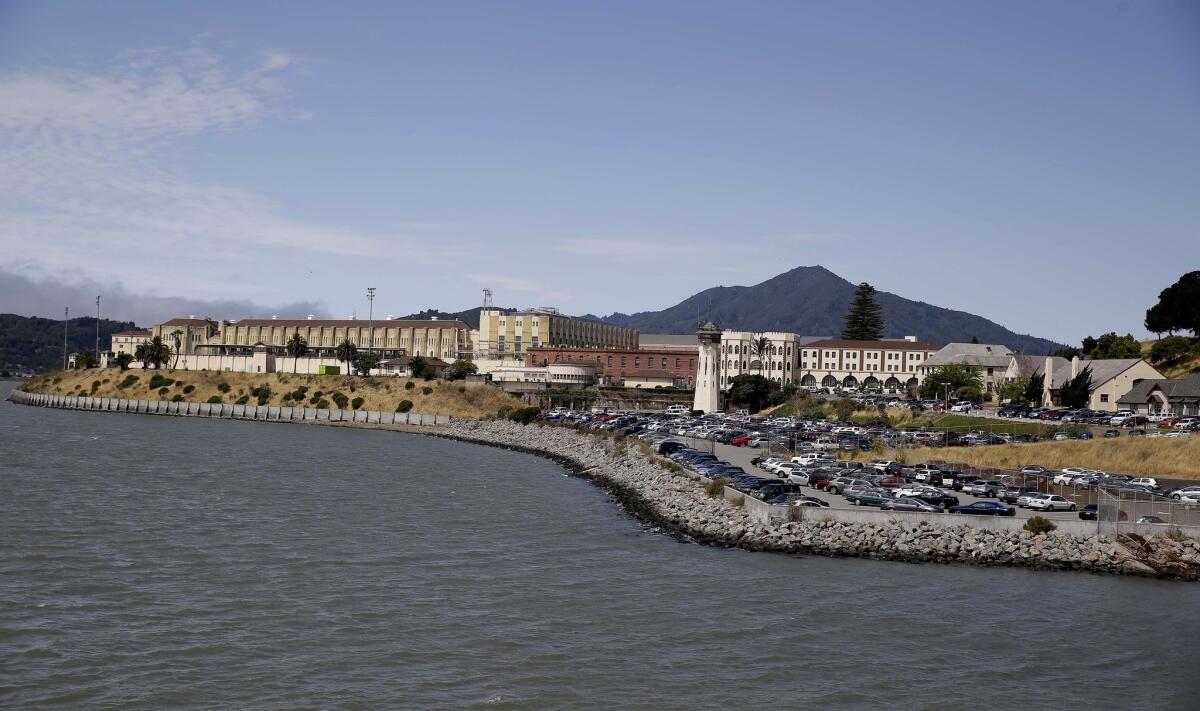Opinion: When it comes to the death penalty, California should follow Nebraska

The San Quentin State Prison, which houses the 729 men on California death row. There are 21 women on death row at the Central California Women’s Facility near Chowchilla.
- Share via
If 32 members of the Nebraska legislature hold firm, the Cornhusker State could become the 19th state to end the death penalty, a slow but important step - I hope - toward nationwide abolition (an effort in Delaware recently stalled, unfortunately).
It’s also significant that Nebraska is a conservative Republican state, and the vote reflects a bit of ground-shifting in that political sector.
“I’m a conservative guy — I’ve been a Republican my whole life,” Sen. Colby Coash, a sponsor of the bill, said before the vote. “A lot of my conservative colleagues have come to the conclusion that we’re there to root out inefficient government programs. Some people see this as a pro-life issue. Other people see it as a good-government issue. But the support that this bill is getting from conservative members is evidence that you can get justice through eliminating the death penalty, and you can get efficient government through eliminating the death penalty.”
However the Nebraska legislators reached the decision, they wound up in the right place. And the California Legislature should take note, because no system in the nation seems to be as dysfunctional as ours.
To remind, California has by far the nation’s largest death row, with 750 people awaiting execution. Yet the state hasn’t carried out that sentence since 2006 because of legal challenges to its three-drug lethal-injection protocol. The state finally stopped defending it two years ago and announced that it would try to develop a new single-drug protocol. But the Department of Corrections and Rehabilitation has been silent on where it stands, and no timetable has been announced.
Meanwhile, U.S. District Judge Cormac J. Carney ruled last July in the Ernest Dewayne Jones v. Ron Davis case that the state’s death penalty system was so dysfunctional it arbitrarily selected who died when, and thus didn’t clear constitutional muster.
The “random few” who ultimately get executed, he wrote, “will have languished for so long on death row that their execution will serve no retributive or deterrent purpose and will be arbitrary.” He added: “No rational person can question that the execution of an individual carries with it the solemn obligation of the government to ensure that the punishment is not arbitrarily imposed and that it furthers the interests of society.”
As I wrote at the time, California’s system is underfunded, under-staffed, and all but stalled. Yet juries keep sentencing people to death. Death penalty proponents argue that the solution is to streamline the process and execute the condemned faster.
The problem with that, though, is the growing realization that the judicial system is so flawed that there are innocent people on death row. One study estimates (conservatively) that at least 4% of condemned inmates nationwide are innocent of the crimes for which they have been convicted. That means of the 750 people on California’s death row (many of whom are severely mentally ill), at least 30 are likely not murderers.
And this is where I would hope more conservatives would come to realize that the system is too flawed. Once the penalty is exacted, there is no way to reverse it should the errors come to light, as they have here and here. If people distrust government to get most things right, why is there faith in its ability to get the death penalty right? Especially in a legal system that is based more on advocacy than on achieving justice?
California voters rejected a 2012 initiative to repeal the death penalty, but that was before the flood of exonerations began headlining the news. It’s not an often-polled subject here, but support seems to be waning. It’s been a hard sell in the legislature, too, as detailed in this amicus curiae brief filed by state Sens. Loni Hancock and Mark Leno and former Assemblywoman Nancy Skinner in the Jones v. Davis.
But the legislature should take it back up. Beyond the pragmatic arguments against capital punishment - add in the absurdly high costs to taxpayers - there’s the underlying immorality of it all. If it’s wrong to kill, it’s wrong to kill.
Executing murderers, no matter how heinous the crime, is still state-committed homicide, and out of step with the rest of our sentencing (do we rob robbers? Embezzle from embezzlers?). The death penalty doesn’t deter - if it did, our murder rate wouldn’t be what it is - it comes too long after the crime to be considered punishment, and it is not justice. It is vengeance. And we need to end it.
Follow Scott Martelle on Twitter @smartelle.
More to Read
A cure for the common opinion
Get thought-provoking perspectives with our weekly newsletter.
You may occasionally receive promotional content from the Los Angeles Times.







